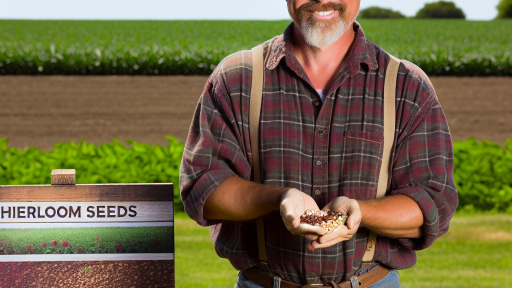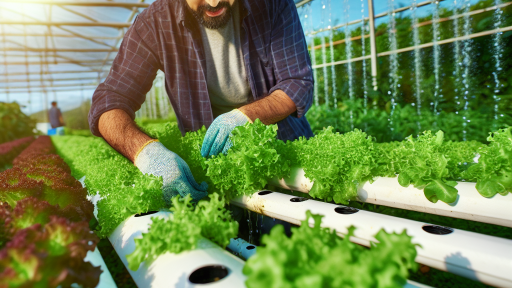Introduction to Heritage Varieties and Their Importance in Agriculture
Heritage varieties play a vital role in sustainable agriculture.
These plants are often open-pollinated and genetically diverse.
They adapt well to specific local environments, enhancing biodiversity.
Farmers can cultivate these varieties to preserve agricultural history.
Additionally, heritage varieties contribute to culinary diversity.
They often boast unique flavors that modern hybrids lack.
Furthermore, they offer resilience against pests and diseases.
By preserving them, we maintain genetic resources for future generations.
This practice also strengthens local economies and communities.
Enhancing Biodiversity on Farms
Heritage varieties increase biodiversity in agricultural ecosystems.
They promote healthier soils and improve water retention.
Moreover, diverse crops lead to better pest control and disease resistance.
Farmers can create a more balanced environment with varied crops.
As a result, these practices support local wildlife habitats.
Connecting with Local Tradition
Planting heritage varieties connects farmers with their cultural heritage.
Transform Your Agribusiness
Unlock your farm's potential with expert advice tailored to your needs. Get actionable steps that drive real results.
Get StartedThese crops tell stories of community and ancestral practices.
Farmers can celebrate their history through traditional farming techniques.
Moreover, local markets often value and seek out unique products.
This enhances community bonds and supports local economies.
Future Implications for Food Security
Preserving heritage varieties is crucial for future food security.
With climate change, their adaptability becomes increasingly important.
Furthermore, diverse crops can mitigate risks in food production.
By maintaining a variety of seed sources, farmers ensure resilience.
Heritage crops can also provide alternatives as conditions change.
Understanding the Genetic Diversity of Heritage Varieties
The Importance of Genetic Diversity
Genetic diversity is crucial for the resilience of crops.
It helps plants endure diseases and environmental changes.
Heritage varieties often provide a rich genetic pool.
This diversity can lead to improved sustainability on farms.
Characteristics of Heritage Varieties
Heritage varieties showcase unique traits and flavors.
These traits often make them more appealing to consumers.
Many heritage varieties have adapted to local conditions.
This adaptation enhances their survival and productivity.
Preserving Genetic Diversity on Your Farm
Farmers play a vital role in preserving these varieties.
They can select seeds from the strongest plants.
Planting diverse varieties increases resilience against pests.
This practice also supports healthier ecosystems.
Challenges to Genetic Diversity
Modern agricultural practices often prioritize uniformity.
This can lead to a loss of valuable genetic resources.
Hybrid varieties may dominate the market, overshadowing heritage options.
Showcase Your Farming Business
Publish your professional farming services profile on our blog for a one-time fee of $200 and reach a dedicated audience of farmers and agribusiness owners.
Publish Your ProfileFarmers must confront these challenges to maintain diversity.
Strategies for Enhancing Genetic Diversity
Implementing crop rotation can promote genetic diversity.
Utilizing cover crops helps improve soil health.
Connecting with local seed banks can provide heritage seeds.
Collaborating with other farmers strengthens shared resources.
Methods for Identifying Heritage Varieties on Your Farm
Conducting a Visual Assessment
Begin by examining your plants closely in the field.
Look for distinctive characteristics, such as unique leaf shapes.
Notice the flowers, fruits, and other features that stand out.
Use a field guide to compare with known heritage varieties.
This process helps to identify potential heritage cultivars.
Engaging with Farmers and Experts
Connect with local farmers who practice heritage farming.
Attend agricultural fairs and heritage breed expos to learn more.
Seek advice from agricultural extension offices or universities.
Experts can help identify and authenticate your varieties.
Collaborating with others enriches your knowledge and resources.
Utilizing Genetic Testing
Consider genetic testing for more precise identification.
Commercial labs offer services to analyze plant DNA.
This method confirms the genetic lineage of your varieties.
It helps distinguish heritage varieties from modern hybrids.
Ensure you follow the lab’s submission guidelines closely.
Documenting Your Findings
Create a detailed record of your observations and findings.
Use photographs to document physical traits and growth patterns.
Maintain a journal that includes planting dates and conditions.
This data assists in making future identification easier.
Consistent documentation improves your farming practices over time.
See Related Content: Setting Up Your First Aquaponic System
Best Practices for Cultivating Heritage Varieties
Understanding Heritage Varieties
Heritage varieties are traditional crops with historical significance.
These varieties often offer unique flavors and better resilience.
They contribute to biodiversity and preserve agricultural heritage.
Choosing the Right Varieties
Select heritage varieties suited to your region’s climate.
Consider local history and agricultural practices when choosing.
Consult with local seed savers for recommendations.
This will ensure the varieties thrive in your environment.
Soil Health and Preparation
Healthy soil is vital for the success of heritage crops.
Conduct soil tests to identify nutrient needs.
Incorporate organic matter to build soil fertility.
Additionally, practice crop rotation to maintain soil health.
Seed Saving Practices
Saving seeds fosters self-sufficiency on your farm.
Make sure to choose seeds from hardy plants for best results.
Store seeds in a cool, dry place for optimal longevity.
Showcase Your Farming Business
Publish your professional farming services profile on our blog for a one-time fee of $200 and reach a dedicated audience of farmers and agribusiness owners.
Publish Your ProfileDocument planting dates and seed origins for future reference.
Integrated Pest Management
Employ integrated pest management to protect heritage varieties.
Use natural predators to control pest populations.
Make careful observations to identify problems early on.
This will minimize the need for chemical interventions.
Community Engagement
Involve your local community in preserving heritage varieties.
Host workshops to teach seed-saving techniques.
Share your experiences and successes with fellow farmers.
Collaboration strengthens the network of heritage variety supporters.
Market Your Heritage Products
Highlight the unique aspects of heritage varieties in your marketing.
Educate consumers about their significance and benefits.
Participate in farmers’ markets to reach potential buyers.
This creates awareness and appreciation for heritage crops.
Delve into the Subject: Best Plants for Hydroponic Systems
Challenges in Preserving Heritage Varieties
Loss of Genetic Diversity
Many agricultural practices focus on high-yield crops.
This often leads to the neglect of heritage varieties.
Consequently, genetic diversity in farming diminishes.
Farmers face challenges in maintaining these unique crops.
Moreover, a lack of seed banks exacerbates this issue.
Climate Change Impact
Climate variability poses a significant threat to agriculture.
Heritage varieties may not adapt as quickly as modern breeds.
Consequently, farmers observe reduced resilience against pests.
This phenomenon increases the risk of crop failure.
Farmers must find alternatives to protect these varieties.
Market Demand and Economic Viability
There is a growing market for heirloom products.
However, traditional varieties often face supply chain challenges.
Many consumers prefer uniform, mass-produced items.
Hence, farmers struggle to obtain fair prices for heritage crops.
Efforts to educate consumers about these varieties can help.
Pest and Disease Susceptibility
Many heritage varieties are more vulnerable to diseases.
This susceptibility stems from their genetic makeup.
Pesticide-averse consumers complicate disease management strategies.
Farmers must adopt integrated pest management approaches.
Possible Solutions
Building Community Seed Banks
Local seed banks can help preserve heritage varieties.
Communities can collaborate to share seeds and knowledge.
This approach fosters genetic diversity and resilience.
Furthermore, it promotes local agricultural heritage.
Enhancing Biodiversity Awareness
Education plays a crucial role in heritage preservation.
Farmers can participate in workshops about heirloom crops.
Communicating the benefits of diversity is essential.
Showcase Your Farming Business
Publish your professional farming services profile on our blog for a one-time fee of $200 and reach a dedicated audience of farmers and agribusiness owners.
Publish Your ProfileIncreased awareness may boost consumer demand.
Promoting Artisan Markets
Artisan markets offer a platform for heritage varieties.
Farmers can sell unique produce directly to consumers.
This enhances visibility and appreciation for diversity.
Moreover, it may provide fair economic returns.
Adopting Sustainable Practices
Sustainable farming practices bolster heritage crop resilience.
Crop rotations and organic methods improve soil health.
These practices also encourage biodiversity.
Farmers should prioritize methods that support heritage varieties.
Gain More Insights: Harvesting Techniques For Container-Grown Plants

The Role of Seed Saving in Maintaining Heritage Varieties
Importance of Seed Saving
Seed saving plays a vital role in agriculture.
It preserves genetic diversity among crops.
This practice helps maintain unique heritage varieties.
Farmers can cultivate specific varieties suited to their local conditions.
Moreover, seed saving encourages a sustainable farming approach.
Benefits of Heritage Seed Varieties
Heritage seed varieties offer numerous advantages.
They adapted well to local environments over generations.
These varieties often exhibit resilience against pests and diseases.
Additionally, they provide a richer flavor profile than commercial varieties.
Farmers benefit from their hardiness and low-input cultivation needs.
How to Save Seeds Effectively
Understanding techniques is crucial for effective seed saving.
Start by selecting healthy plants at harvest time.
Ensure you allow seeds to mature fully on the plant.
Next, harvest the seeds carefully to avoid damage.
Finally, store seeds in a cool, dry place for optimal longevity.
Community Involvement and Knowledge Sharing
Joining a local seed-saving community can enhance the experience.
These groups often share valuable resources and knowledge.
Participating in seed swaps can diversify your seed collection.
Furthermore, sharing stories and practices fosters a strong network.
Such connections can nurture a deeper appreciation for heritage seeds.
Explore Further: Scaling Your Hydroponic Farm Successfully
Promoting Heritage Varieties Through Community Engagement and Education
Building Awareness
Community engagement starts with raising awareness about heritage varieties.
Host events to showcase the uniqueness of these crops.
Offer workshops that explain their cultural significance.
Utilize social media platforms to spread the word.
Engage local schools to incorporate this topic into their programs.
Encouraging Participation
Encouragement can drive community participation.
Create community gardens featuring heritage varieties.
Invite locals to join in planting and maintenance activities.
This hands-on experience fosters a deeper connection.
Showcase Your Farming Business
Publish your professional farming services profile on our blog for a one-time fee of $200 and reach a dedicated audience of farmers and agribusiness owners.
Publish Your ProfileOrganize contests to promote friendly competition among neighbors.
Providing Education and Resources
Education is crucial for preserving heritage varieties.
Share knowledge about planting, caring, and harvesting these crops.
Distribute pamphlets and brochures with best practices.
Host speaker series featuring experts in heritage conservation.
Employ local farmers to lead workshops and share their stories.
Creating Partnerships
Partnering with local organizations strengthens efforts.
Collaborate with universities for research and outreach.
Work together with non-profits focused on agricultural diversity.
These partnerships can amplify resources and reach.
Additionally, they can attract funding for community projects.
Cultivating a Sense of Ownership
Fostering a sense of ownership encourages local stewardship.
Empower community members to take responsibility for the plants.
Establish a network of guardians for these heritage crops.
Regularly involve participants in decision-making about gardens.
This involvement builds pride and investment in the outcome.
Marketing Heritage Varieties
Understanding Your Audience
Identifying your target consumers is essential for success.
Understand their preferences and values relating to food.
Many consumers desire sustainably grown produce.
Others cherish unique flavors and traditional varieties.
Conduct surveys to gather insights about their interests.
Creating a Compelling Brand
A strong brand can differentiate your heritage varieties.
Focus on storytelling to connect with your audience.
Share your farm’s history and passion for preserving varieties.
Use visuals to highlight the uniqueness of your crops.
Engage with consumers through social media platforms.
Utilizing Local Markets
Participate in farmers’ markets to increase visibility.
Set up a booth showcasing your heritage produce.
Offer samples to attract consumers and build interest.
Network with local restaurants interested in unique ingredients.
Collaborate for farm-to-table initiatives to expand reach.
Emphasizing Health Benefits
Highlight the nutritional advantages of heritage varieties.
Many contain higher levels of antioxidants and vitamins.
Educate consumers on the importance of biodiversity.
Share research supporting healthier food choices.
Leveraging Online Platforms
Create an engaging website to showcase your offerings.
Share recipes featuring your heritage varieties.
Utilize e-commerce solutions for direct sales.
Join online communities focused on sustainable and heritage foods.
Participating in Educational Programs
Host farm tours to educate consumers about heritage crops.
Showcase Your Farming Business
Publish your professional farming services profile on our blog for a one-time fee of $200 and reach a dedicated audience of farmers and agribusiness owners.
Publish Your ProfileOffer workshops that teach sustainable farming practices.
Invite local schools for field trips and hands-on experiences.
Collaborate with universities on research projects.
Additional Resources
The Maine Farmer Saving the World’s Rarest Heirloom Seeds
#6 – Concept Reference, Must Be True – LSAT Discussion Forum




